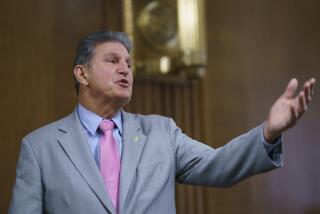Harvard Greets 27 Elite Freshmen for a Lesson on Handling Money
- Share via
CAMBRIDGE, Mass. — The federal budget deficit may be the No. 1 problem facing the 101st Congress, but no easy answers were offered at this weekend’s Harvard symposium for 27 newly elected members of Congress.
The problem “is one we are going to be dealing with, and I think not just in the next two years,” Alice M. Rivlin, a senior fellow in economic studies at the Brookings Institution in Washington, told the legislators-elect at the opening session Friday.
“The budget deficit is going to dominate thinking . . . about fiscal policies for the foreseeable future and I expect for much of your congressional careers, which I hope are long ones,” she said.
Rivlin briefed the new legislators for more than an hour on the budget shortfall and assorted theories on correcting it in the only public session planned during a five-day series of seminars.
Part of Orientation
The program at Harvard’s John F. Kennedy School of Government is co-sponsored by the House Administration Committee. It has been held every two years since 1972 as part of the orientation for new members of Congress.
The budget deficit, which in the fiscal year ending Sept. 30 was $155.1 billion, “is the No. 1 topic we discussed throughout our campaign” and the one issue most on constituents’ minds, newly elected Georgia Democrat Ben Lewis Jones said.
To deal with it “we are going to have to make some tough choices, and they (Georgia voters) sent me here to make those tough choices,” Jones said.
But as Democratic Rep.-elect Richard Neal of Massachusetts said: “It is very easy to define the problems, but it’s very difficult to provide solutions.”
Rivlin noted that the deficit has been shrinking “and with good luck in the economy, the budget deficit will come down a little bit more. And that is progress.”
But she said a large part of the reason for that progress is that surpluses in the Social Security system are being used to pay for “current expenses of government and to offset the large deficit of the rest of the federal budget.”
Saying the money might be better used to buy back government debt and prepare for the large numbers of retirees who will be making claims on Social Security in the years ahead, she said: “It’s important to be clear--things are worse than they seem.”
Long-Term Planning
Newly elected Mississippi Democrat Paul Michael Parker said that unlike the European community, the United States is always looking for short-term solutions. “We lack that long-term planning.”
Yet when Rivlin offered long-term proposals to ease the deficit, several new representatives bristled.
Rivlin said Congress could consider a broad-based value-added tax, such as a national sales tax, and “getting rid of some of the major functions of the federal government and turning them over to the states,” such as housing and education programs.
The legislators-elect challenged the sales tax idea as regressive, or tending to hurt the poor, and said putting more demands on the states would be “unbearable” for local governments.
More to Read
Get the L.A. Times Politics newsletter
Deeply reported insights into legislation, politics and policy from Sacramento, Washington and beyond. In your inbox twice per week.
You may occasionally receive promotional content from the Los Angeles Times.










